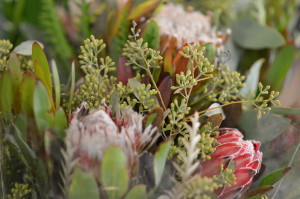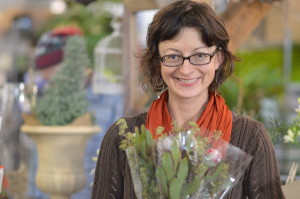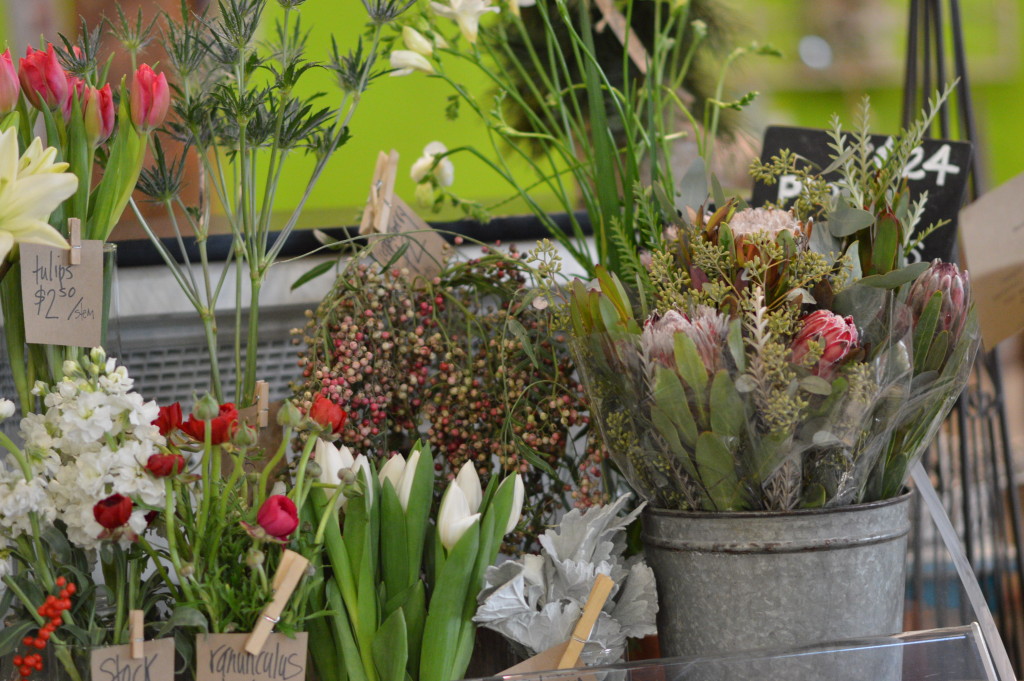
Anne Armitage helps a customer at Bark & Bloom at the NewBo City Market in Cedar Rapids, Iowa. (photo/Cindy Hadish)
By Cindy Hadish/for Radish Magazine
Anne Armitage sells locally grown flowers at Bark & Bloom in the NewBo City Market in Cedar Rapids, but sourcing locally is nearly impossible for Midwestern florists in the winter.
“It’s very challenging,” said Armitage, who has to rely on what wholesale suppliers make available in Iowa during cold weather months, particularly for the Valentine’s Day rush.
What’s available typically isn’t the socially responsible and eco-friendly flowers that Armitage prefers, but some of her winter selection is grown in the United States, and customers seeking the environmental route can ask about the origin and look for special certifications.
Fair Trade Certified flowers offer one way to ensure that the flowers you purchase for Valentine’s Day or other occasions come from farms where the workers are treated fairly.
Nearly 80 percent of cut flowers sold in the United States are grown in Latin America, South America and Africa, where workers are often exploited to keep costs low, according to One World Flowers. Fair Trade certification ensures that workers on large-scale flower farms have access to unions, receive better wages, and work under safe labor conditions with protective equipment and proper training, Fair Trade USA notes.
With the Fair Trade premium, 10 percent of the commercial price of every stem sold is allocated to a development fund that allows workers to invest in their communities, such as building a school or offering daycare to workers. Bouquets sold under the program are marked with the Fair Trade logo on their packaging, so customers know what they are purchasing.
“One of the biggest problems in that industry is poisoning workers with pesticides,” said Becke Dawson, owner of the SIS International Shop in Davenport. That leads to not only health issues for the workers, but birth defects, as a majority of those workers are women, she added.
Fair Trade flower farms ban the use of dangerous chemicals and train workers in safe handling of approved pesticides. Those are among the reasons Dawson has carried Fair Trade roses for Valentine’s Day at her store. While she was unsure whether or not she would have the roses again this year, she said she is supportive of the model.
Items at SIS International Shop, 108 E. Second St., Davenport, are often hand-crafted by artisans in countries where there are few income opportunities, so Fair Trade flowers fit the store’s mission, Dawson said.
“It’s really a huge plus for the floral industry to use Fair Trade,” she said.
Fair Trade Certified flowers can be found at stores in Iowa and Illinois, including Whole Foods Market and Jewel-Osco and online at Oneworldflowers.org; 1800flowers.com and FTD.com, for example.
Stores such as The Fresh Market carry Rainforest Alliance certified flowers. The group’s standards protect ecosystems and wildlife habitats, conserve water and soil, promote decent and safe working conditions and ensure that the farms are good neighbors to rural communities, according to its website.

Proteas are grown at the Resendiz Brothers farm in California and sold at Bark & Bloom. (photo/Cindy Hadish)
Sourcing locally is another way for florists and customers to know the practices behind the products. When starting Bark & Bloom several years ago, Armitage had hoped to source everything from the United States, but soon discovered the challenges.
She cited “Flower Confidential,” a book that explored the international floral industry, in noting that flowers such as carnations, roses and chrysanthemums are rarely commercially grown in the United States because they can be grown so cheaply in South America.
The book, written by Amy Stewart, noted that wages for floral farm workers in Ecuador averaged just $150 per month, and flowers imported into the United States are fumigated with chemicals before being shipped to their destinations.
Those are among the reasons Armitage cited for buying locally grown flowers.
Armitage grows some of her own flowers, while many are from Pheasant Run Farm near Van Horne, which doesn’t use chemicals like those sprayed on imported flowers.
Fragrant lillies, colorful snapdragons, dahlias and zinnias are among the flowers grown at Pheasant Run Farm, while some sold at Bark & Bloom come from a family farm in California during the winter months. The Resendiz Brothers farm, in San Diego County, grow proteas, which Bark & Bloom sells in exotic-looking floral bouquets. She cited the family farm model as a huge selling point, along with the quality of the proteas and growing methods. The same is true of the flowers from Pheasant Run.
“Personally, I don’t want to be handling anything with chemicals if I don’t have to,” Armitage said. “Plus, I like supporting other local businesses and the quality of the flowers. They’re just so fresh; there’s no comparison.”
Learn more about Bark & Bloom at: www.barkandbloom.com and SIS International Shop at www.sisshops.com
Read more about healthy living at: Radish Magazine



No Comments Yet